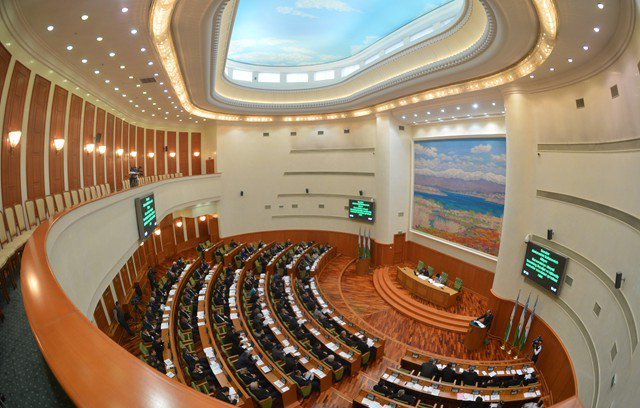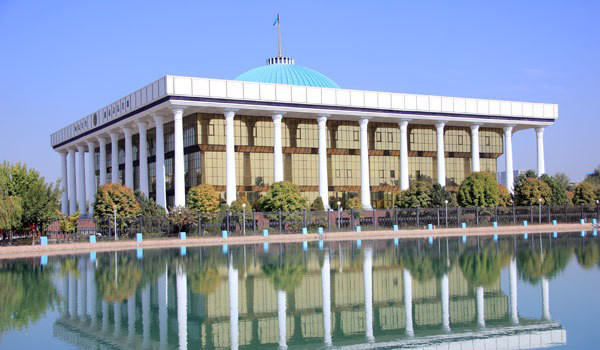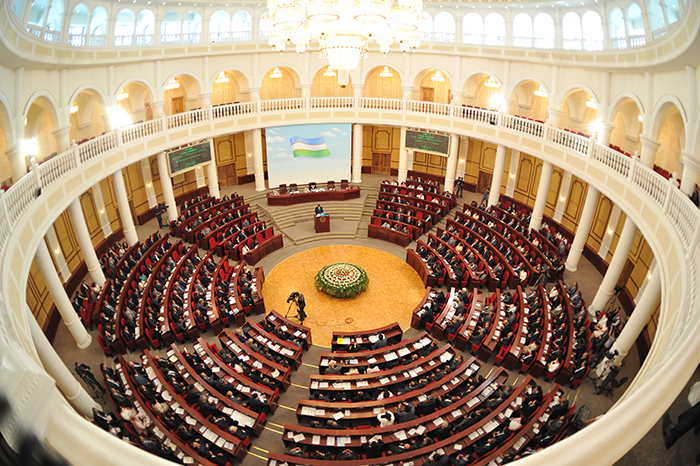
From the first days ofindependence, Uzbekistan has been following a path on building a democraticstate and just civil society. Looking back on 25-year path of independent development,we can say with full confidence that the huge work for socio-economic andsocio-political reforms, which led to large-scale achievements and successes inall spheres of public life and society, has been done.
Theliberalization of legal system and economy, democratization and modernizationof the state - these processes continue to be carried out in Uzbekistanstage-by-stage and interconnected, according to national peculiarities andadvanced international practices.
Animportant component of a democratic state is a strong and fair legal system,which provides guarantees for protection of the rights and interests ofcitizens, which, in turn, creates the conditions for prosperity and progress ofthe country.
InUzbekistan over the years of sovereign development a series of reforms havebeen carried out with an aim to improving judicial system, transforming it tothe main guarantor of effective protection of human rights and ensuring genuineindependence of judiciary.
Eventhe first Law "On Courts" dated September 2, 1993, stipulated suchuniversally recognized principles as the presumption of innocence, right toprotection, competition and publicity of trial, other principles, which thenfurther developed in the new Criminal Procedure Code and Civil Procedure Codeand other legislative acts of the republic. At this stage of reform thelegislative fundamentals of legal proceedings, truly independent andself-supporting judicial system were laid down.
OnAugust 30, 1995, taking into account world experience, the Constitutional Courtwas established in the country. This body ensures the compliance of acts withlegislative and executive branches to Basic Law of the country. In the courseof further development of the judicial sphere, the system of economic courtshas been established, which in conditions of transition to a market economy hasbecome an important factor in ensuring the rule of law in economic relations.Courts of general jurisdiction were also established. The legal framework ofthe judicial system has been expanded.
Animportant step in the liberalization of the judicial sphere was the adoption ofthe new edition of the Law "On Courts" dated December 14, 2000, whichembodied the experience of reforming the judicial system, accumulated over theyears of independence. In accordance with this document, effective mechanismsfor implementation of constitutional principle of separation of powers andindependence of court as a full-fledged independent branch of power have beencreated, and the judicial system was completely derived from the control andinfluence of the executive power. Along with this specialization of courts oncriminal, civil and commercial matters has been fixed. The appeals procedurefor consideration of cases has been entered and cassation instance has beenreformed. Life itself has shown the correctness of this decision, asspecialization of courts has improved the quality of cases and increasedguarantees for protection of rights and freedoms of citizens. The law alsoencompasses the issues of selection and appointment of judicial personnel.
TheHigher qualification commission for selection and recommendation of judgesunder the President of the Republic of Uzbekistan has been created in order tostrengthen the independence of judiciary, democratic principles of formation ofcadres' reserve, transparency in selection and recommendations of candidatesfor the post of judges, assurance of stability and efficiency of judiciary inthe country. Alternative mechanism of dispute resolution ? "the arbitraltribunal" has been developed.

Inaddition, the age limit was determined for persons for the first time beingappointed for the position of judges of inter-district, district (city) courts.Qualifying requirements for training of judges, necessary legal and socialguarantees for independent legal procedures were consolidated. Protection ofsocial status of judicial bodies’ employees was strengthened.
Aspart of active introduction of modern information and communicationtechnologies in activities of courts, improvement of legal proceedingsefficiency, extensive measures were taken in the sphere of informatization andeffective use of computer technologies, establishment of information systemsand resources in courts, expansion of scope of provision of interactiveservices to businesses and public and, most importantly, implementation ofe-judicature, which has been successfully applied in many countries.
Startingfrom 2013 the system of economic courts and from 2015 the courts on civil casesa mechanism that allows executing necessary documents for proceedings inelectronic form has been in place. Use of videoconferencing in the activity ofeconomic courts provides the possibility of receiving citizens in avideoconference mode, monitoring of trials, conversation of citizens withleadership of economic courts. All this enables to make the most efficientoversight over judicial activities provided for in Article 43 of the Law of theRepublic of Uzbekistan "On Courts".
Alongwith the judiciary system profound reforms are taking place in the system ofthe Ministry of Justice, Ministry of Internal Affairs, General Prosecutor'sOffice and other law-enforcement agencies that ensure lawfulness and legalorder in society.
Inaccordance with Articles 43, 44, 116 of the Constitution, everyone isguaranteed judicial protection of his rights and freedoms, right to appeal anyunlawful action of state bodies, officials, public associations, right toprofessional legal assistance at any stage of investigation and courtproceedings. In this regard, consolidation of the institute of advocacy becameone of priorities in the course of further implementation of judicial reforms,which are aimed at ensuring effective protection of human rights and freedoms.Civil and social institutions were established. They include Ombudsman,National Centre for Human Rights and a number of others structures. Thepresence in the state of persons, who can provide competent and qualified legalaid, is the key to existence of a harmonious society as a whole, legaleducation and democratization.
Overthe years of independence liberalization, humanization and decriminalization ofcriminal and criminal-procedural legislation have become the most importantarea of criminal court proceedings.
Onecan assert that measures taken in this area, in particular the Law "Onintroducing amendments and additions to Criminal, Criminal-Procedural Codes andCode of the Republic of Uzbekistan on administrative responsibility inconnection with liberalization of criminal punishments" of 2001, hadsignificant social and socio-political importance. The list of grave crimes wasreduced, resulting in about 75% of crimes from the category of grave andgravest crimes transferred into the category of crimes that do not pose greatdanger to society and less serious ones. Along with this alternative forms ofpunishment for crimes, not related to deprivation of liberty, were introduced.Punishments on 87 elements of crimes were commuted; in 26 elements of crimes penaltiesof imprisonment were excluded.
Inaccordance with the amendments to criminal-procedural legislation, terms ofinvestigation and detention of persons in custody were reduced; on 11 elementsof crime use of imprisonment with compensation of property damage caused byeconomic crimes was limited. Opportunities on cases of crimes in the sphere ofeconomy were significantly expanded ? economic sanctions in the form of finesare being applied instead of arrest or imprisonment. Such form of punishment asconfiscation of property has been excluded from the system of penalties.
Incontinuation of this work on August 27, 2004, an institute of reconciliationwas introduced in law-enforcement, judicial practice, and now this legalmechanism effectively functions. According to it, the perpetrator, who does notpose great danger to society and fully compensate material and moral damages tothe victims, is not involved in criminal liability. The effectiveness of thisinstitution, its compliance with such centuries-old traditions of the Uzbekpeople, as compassion and forgiveness, became the basis of its consistentexpansion.
Theabolition of death penalty from January 1, 2008. It became the most importantstep in the liberalization of criminal legislation. In addition, capitalpunishment - life imprisonment is applied only to 2 kinds of crimes - forterrorism and premeditated murder under aggravating circumstances, on whichalternative, less severe punishments also may be applied. In the country thistype of punishment cannot be prescribed to women, persons who have committedcrimes under the age of 18, men over sixty years.
TheConcept of further deepening democratic reforms and formation of civil societyin the country, which was developed by country's President Islam Karimov, hasmarked a new stage in providing complete and reliable protection of humanrights and freedoms in Uzbekistan. This policy document a series of measures onexpansion of the scope of "Habeas Corpus" Institute, furtherdevelopment of mechanisms to ensure independence, objectivity and impartialityof the court, enhancing competitiveness in the trial, liberalization ofcriminal legislation, raising the level of legal culture of citizens have beenidentified.

In thecourse of implementation of tasks set by the President of Uzbekistan,incorporating international legal standards into national legislation,improving their application in practice is carried on. This is also facilitatedby international cooperation with UNDP, OSCE and other international organizations.Dialogue with the European Union is actively developing, a number of jointprojects to support reforms in the judicial sphere have been implemented.
Thedynamic socio-economic development of independent Uzbekistan and activepromotion of private ownership and entrepreneurship in the country led toreforms in this area. The resolution "On measures to ensure reliableprotection of private property, small business and private entrepreneurship,the removal of barriers to their rapid development" signed by thePresident of Republic of Uzbekistan on May 15, 2015, is aimed at increasingresponsibility of state’s officials, law-enforcement and regulatory authoritiesfor obstruction and illegal interference in entrepreneurial activity, violationof private property rights, as well as strengthening protection of privateproperty guarantees the continuation of the liberalization process ofadministrative and criminal legislation regulating entrepreneurial activity.
Thelaw is large-scale document, which facilitates reforming criminal legislationtowards its liberalization through implementation of a number of internationallegal norms. In particular, the document incorporated UN Convention againstcorruption. This law differentiated responsibility for corruption crimes ofstate and private sector. It makes provision for offenses like commercialbribery, bribery of employee of non-state commercial or other non-governmentalorganization, abuse of authority of officials of non-government commercial orother non-governmental organization.
Thecriminal legislation has been liberalized through the mitigation of liabilityof officials engaged in administrative-distributive and administrative-economicpowers in business structures and other non-governmental organizations throughthe introduction of separate articles in the Criminal Code, which provides forsofter penalties.
TheCode of Administrative Liability was amended. According to amendments, theconfiscation of property for administrative offenses carried out solely on thebasis of court decisions.
In theEconomic Procedural Code examination procedure of corporate disputes has beenconcretized. In addition, the code improved the procedure for consideringcomplaints pertaining to compensation for damage caused to businesses by anillegal act adopted by a state body, citizens' self-government body orcommission of illegal action (inaction) by their officials.
Theadoption of the Law "On Parliamentary Control" dated April 11, 2016,was an important event in a series of democratic reforms and significant forthe legal system of the Republic of Uzbekistan. The purpose of this normativeact was to regulate relations in the field of organizing and monitoring theactivities of public authorities and management and their officials onobservance of the Constitution and other laws of Uzbekistan, Oliy MajlisChambers and their agencies’ decision, state programs, as well as onimplementation of tasks and functions entrusted to them. In this context,parliamentary control covers a scope of activity of the prosecutor's officebodies, thereby increasing the effectiveness of their efforts to ensure therule of law in the country, protection of citizens’ rights and freedoms,interests of society and state.
Thus,the judicial and legal reforms in Uzbekistan, which are filled with ideas ofhumanism and aimed at ensuring the rule of law and protection of citizens’rights and interests, have strengthened the foundation of the young independentstate as an international community's full-fledged member that develops in ademocratic way. Their results became the guarantee of peace and stability,progress and prosperity, and most importantly - well-being and happiness ofevery citizen of the Republic of Uzbekistan.


